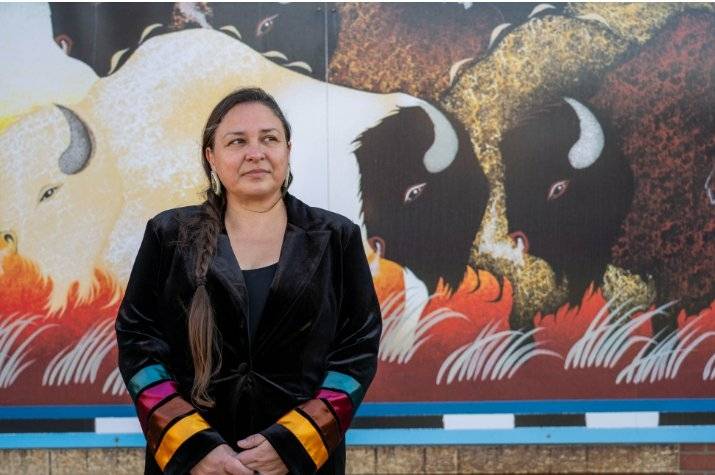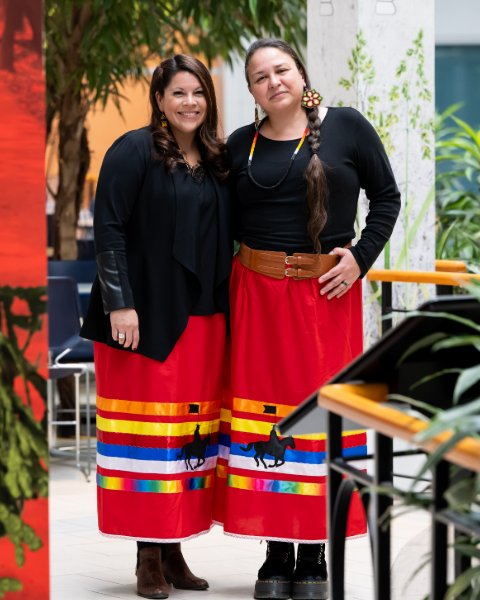RCMP offers Mi’kmaw language training in new pilot project
By George Saliba

Karine Way is the RCMP’s first National Indigenous Languages coordinator.
Image by RCMP
September 26, 2025
Content
A group of 35 RCMP employees in Nova Scotia is the first to begin Indigenous language training, as part of a new pilot project that the organization has launched to reinforce its commitment to reconciliation.
"To recognize the language is to recognize the culture,” says Daniel Campbell, Director of Official Languages at the RCMP. He says the training comes on the heels of the creation of the Indigenous Languages Program (ILP) led by the RCMP's Directorate of Official Languages (DOL).
“With more than 70 distinct First Nations, Inuit, and Métis languages in Canada, our program seeks to support and promote the use of these languages, and to create opportunities to strengthen relationships with the Indigenous communities we serve,” says Campbell.
The Program, which continues to expand, is in line with the Indigenous Languages Act and aims to help RCMP employees better serve Indigenous communities. Its creation, and the language training pilot, stem directly from a series of public and internal engagement activities the DOL conducted last year as part of the RCMP's official languages strategy.
“Indigenous community members shared with us that training RCMP officers and employees in Indigenous languages would help strengthen relationships and trust with the communities they serve,” says Karine Way, the RCMP's first Indigenous Languages Coordinator. “We heard them, and the Indigenous Languages Program pilot project aims to do just that.”
Way, a member of the Cree First Nation of Waswanipi, Quebec, was appointed to the position in December 2023 upon the creation of the Program.
Engagement and feedback

Image by Serge Gouin, RCMP
To determine how to best meet the language needs of First Nations, Inuit and Métis Peoples, and to ensure the ILP was aligned to meet these objectives, the DOL began a series of engagement activities with Indigenous RCMP employees, organizations, and communities. These included face-to-face engagement and surveys, with participation from members of the Women's Indigenous Network (WIN).
“By engaging with Indigenous employee networks, organizations leverage the expertise, knowledge and experiences of Indigenous People who understand the unique challenges and opportunities within both the RCMP and their communities,” says Sergeant Kelly Willis, the founder and chair of WIN.
"Indigenous employee networks like ours help shape programs that matter to our communities," said WIN Co-Chair Tracey Paul Kirkpatrick. "We value opportunities to work with organizations to ensure initiatives like the Indigenous Languages Program are culturally relevant and truly support reconciliation."
One major point of feedback from community members was that the ability of RCMP employees to communicate in Indigenous languages would foster stronger relationships and support language-revitalization efforts.
"When we talked to First Nations communities in Nova Scotia and Inuit groups in Nunavut, we heard the same message — having Indigenous language skills would help the RCMP recruit more Indigenous employees—a real step toward reconciliAction," says Way.
Public engagement also showed that there’s already an appetite among some RCMP employees who don’t speak an Indigenous language to take advantage of Indigenous language tools and training.
Mi'kmaw language training
“We hope the Indigenous language training opportunities will help strengthen the cultural ties between RCMP employees and the communities they serve, and support First Nations, Inuit and Métis employees who are looking to reclaim, maintain, strengthen or revitalize their traditional language,” says Way.
RCMP employees in Nova Scotia are piloting Mi'kmaw language training through two programs: an online basic Mi'kmaw course and a Mentor-Apprentice Program (MAP).
The online course teaches key phrases and cultural understanding, while the MAP provides immersive, one-on-one instruction with a Mi'kmaq mentor. The first MAP sessions are expected to begin in September 2025.
"Professionally, it has been a valuable asset in my current role as the Body-Worn Camera Coordinator, where I review footage for multiple Mi'kmaq communities in Nova Scotia," says course participant Nicole Illsley. "Many community members communicate in the Mi'kmaq language, so this training has greatly enhanced my ability to understand and support them more effectively."
Illsley says the main reason she enrolled in the course was to deepen her understanding of Mi'kmaq culture.
"Through this training, I've developed a profound appreciation for the language,” says Illsley. “It has made it easier for me to understand and engage with the culture and community."
The DOL is also exploring relationships with additional First Nations, Inuit and Métis language training providers to expand the program nationally.
“We're pleased to see the RCMP taking steps to prioritize Indigenous language training and look forward to continued engagement,” says Willis. “The Indigenous Languages Program and the Mi'kmaw pilot mark a significant step in advancing reconciliation efforts within the RCMP.”